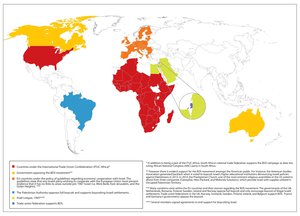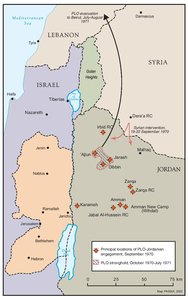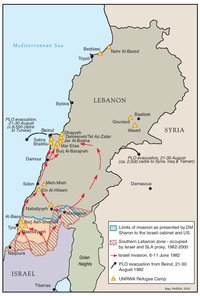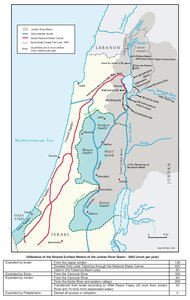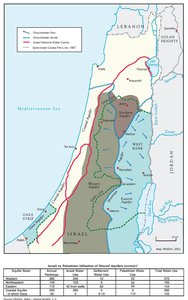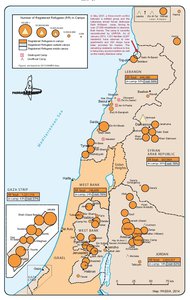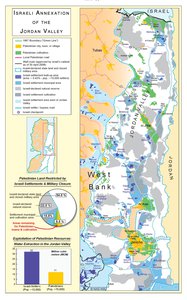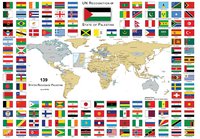THE GLOBAL BDS MOVEMENT
Map Details
In 1945, the Arab League introduced a large scale boycott strategy to defend the Palestinian cause by
shunning Zionist goods and services in Mandatory Palestine. After Israel gained international recognition
as a state in 1948, the Arab League officially redirected the boycott against the new state as well as its
economic partners and supporters. While the Arab League never officially ended the boycott, several of its
members have signed agreements to end their support of it. The Palestinian leadership renounced the
boycott with the signing of the 1993-1995 Oslo Accords when the PLO committed itself to economic
cooperation with Israel (see Map 27). As of today, the impact of the boycott is believed to be negligible
since it is only "sporadically applied and ambiguously enforced."
When the Israeli response to the Al-Aqsa Intifada brought death and destruction to the OPT from
September 2000 onwards, Palestinians began to look for (new) non-violent strategies aimed at pressuring
Israel into supporting the establishment of an independent Palestinian state, as alternatives to the violent
means being employed, which increasingly proved themselves to be counterproductive. The idea of a
grassroots boycott campaign targeting Israel quickly gained popularity and resulted in preliminary calls for
academic and cultural boycotts in 2002 and 2003, which lay the groundwork for the establishment of the
‘Palestinian Campaign for the Academic and Cultural Boycott of Israel’ (PACBI) in April 2006 and its official
call for boycott two months later.
On 9 July 2005, exactly one year after the International Court of Justice issued an advisory opinion calling
on Israel to dismantle the separation barrier in the West Bank since it was illegal under international law, the
PACBI was supplemented by a more general economic boycott campaign when a coalition of Palestinian
civil society actors issued the call for "Boycott, Divestment and Sanctions [BDS] against Israel Until it
Complies with International Law and Universal Principles of Human Rights." The BDS movement called on
civil society organizations and individuals all around the world to initiate and support such "non-violent
punitive measures" – which resembled the international boycott of South Africa's apartheid regime in the
second half of the 20th Century – until Israel recognizes the Palestinian people’s right to self-determination
and complies with its obligations under international law by first of all "ending its occupation and
colonization of all Arab lands and dismantling the Wall," secondly "recognizing the fundamental rights of the
Arab-Palestinian citizens of Israel to full equality" and thirdly "respecting, protecting and promoting the rights
of Palestinian refugees to return to their homes and properties as stipulated in UN Resolution 194."
The call for BDS was initially endorsed by over 170 Palestinian civil society organizations, including "all
major political parties, refugee rights associations, trade union federations, women's unions, NGO networks,
and virtually the entire spectrum of grassroots organizations." With the growth of the BDS movement the
need for some form of general coordination increased, leading supporters to organize the first Palestinian
BDS conference in November 2007, which, in turn, brought about the establishment of the BDS National
Committee (BNC) tasked with the coordination of the BDS campaign.
As of 2014, the BDS campaign has not gained explicit support from any national government, but South
Africa's ruling African National Congress (ANC) party declared support for the movement in 2012, and
various prominent individuals, grassroots movements, NGOs, corporations, churches, and academic
institutions around the world have endorsed the BDS movement. A number of (inter)national trade union
federations have also expressed support for BDS, including those of Belgium, Brazil, Ireland, Norway,
Scotland, South Africa, Sweden and the UK, as well the African Regional Organisation of the International
Trade Union Confederation (ITUC-Africa), representing 56 national trade union federations from 45
countries.
The BDS campaign has been heavily criticized by Israel, with Prime Minister Netanyahu accusing the
movement of propagandizing anti-Semitism and the destruction of the "Jewish state." The US government
also opposes the movement. Other national administrations that have voiced opposition against the BDS
campaign include those of Australia, Canada, Denmark, France, Germany, Ireland and Sweden. While
Palestinian President Abbas has criticized the BDS movement for boycotting Israel as a whole, he has
called on the international community to boycott companies operating in Israeli settlements. Similarly, the
governments of the UK, the Netherlands, Norway and Romania have opposed a full boycott of Israel, while
actively discouraging national corporations and/or laborers from operating in Israeli settlements.
Furthermore, in July 2013 the EU adopted a new policy of guidelines regarding economic cooperation with
Israel, according to which the EU will no longer fund Israeli entities that operate in the settlements.
While opponents of the BDS campaign have accused it of advocating anti-Semitism and the destruction of
Israel, supporters have stressed that the movement opposes discrimination in any form and supports a
peaceful resolution of the Palestine-Israel conflict but "does not adopt any specific formula and steers away
from the one-state-versus-two-states debate." Currently, the BDS movement includes both supporters
who advocate a one-state solution as well as proponents of two-state solution to the conflict.

